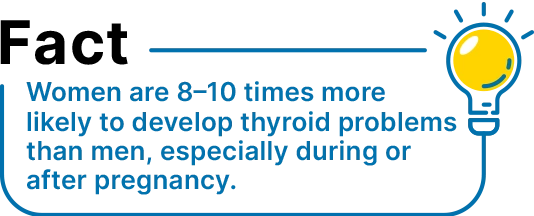Regain Control of Your Thyroid, Naturally
Effective Thyroid Treatment Without Side Effects
Book your Appointment
More than 42 million Indians live with thyroid disorders, and many do not even know it. The thyroid is a small, butterfly-shaped gland in the neck that regulates metabolism, energy levels, and hormonal balance.
When this gland is underactive or overactive, it can lead to symptoms like sudden weight gain or loss, constant fatigue, hair thinning, and emotional instability. If left unchecked, these imbalances can quietly disrupt one's life.
At Dr Batra’s®, we offer homeopathic treatment for thyroid disorders that addresses the root cause. We combine homeopathy with modern aesthetic treatments. Our personalised approach ensures long-term results without lifelong dependency.
Root-Cause Diagnosis
Detailed consultation and diagnostics help identify thyroid type, hypothyroidism, hyperthyroidism, Hashimoto’s, or stress-related imbalance
Homeopathy & Aesthetic Care
We treat internal thyroid issues and external symptoms like hair fall and skin concerns for lasting results
Personalised Treatment Plans
Each plan is customised to your thyroid profile, lab reports, and specific symptoms for long-term relief
Safe & Side-Effect-Free Care
Our non-hormonal, homeopathic treatment supports thyroid health naturally without dependency
40+ Years of Trust
With 1.5M+ patients and 200+ clinics in 6 countries, we bring proven expertise in thyroid care

Unexplained weight gain or loss
Persistent fatigue or low energy
Hair thinning and dry skin
Mood swings, anxiety, or depression
Irregular menstrual cycles or fertility issues
Brain fog or poor concentration
Menstrual irregularities
A MedCrave study shows hypothyroidism affects 5 in 100 people, with women at higher risk. It also increases chances of infertility and pregnancy complications.
Hormonal Imbalance
Disrupted T3, T4, and TSH levels
Autoimmune Conditions
Such as Hashimoto’s Thyroiditis or Graves’ Disease
Genetics
Family history of thyroid issues
Stress
Chronic stress disrupts endocrine function
Nutritional Deficiencies
Iodine, selenium, and vitamin D imbalances
Medications or Lifestyle Factors
Certain drugs or poor lifestyle habits
Our thyroid treatment goes beyond conventional medications. We focus on treating the root cause, restoring hormonal balance, reducing symptoms, and supporting long-term health without dependency
These therapies complement internal healing while improving visible symptoms of thyroid disorders.

| Treatments Aspect | Conventional Treatments | Homeopathy Treatments |
|---|---|---|
| Focus | ||
| Medications | ||
| Side Effects | ||
| Personalisation | ||
| Long-Term Support |
Thyroid conditions are often chronic but manageable. Dr Batra’s® homeopathic treatment targets root causes, helping reduce symptoms and medication dependency over time
Yes, homeopathy at Dr Batra’s® gently balances thyroid hormones, improves symptoms like fatigue and hair loss, and supports long-term health without side effects or synthetic hormones
Not always but in most cases. Dr Batra’s® aims to reduce lifelong medication by restoring thyroid function naturally through personalised homeopathic care
Dr Batra’s® treats the root cause with homeopathy, combined with aesthetic and lifestyle support, unlike conventional therapy that focuses mainly on symptom control
Yes, but weight loss can be slow. Dr Batra’s® offers homeopathic remedies and a specialised weight management program personalised for thyroid-related weight issues
Some notice improvements in energy and mood within 3-4 weeks; hormonal balance may take months. At Dr Batra’s® we monitor progress regularly for lasting results
At Dr Batra’s®, we treat hypothyroidism, hyperthyroidism, autoimmune thyroiditis, postpartum thyroid issues, and stress-related hormonal imbalances with personalised care
Yes, you can take allopathic medicines alongside thyroid supplements, but only under medical supervision